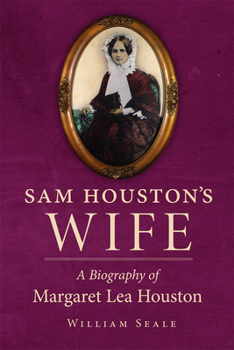Sam Houston's Wife: A Biography of Margaret Lea Houston
Select Format
Select Condition 
Book Overview
Although Sam Houston has been the subject 6f several biographies and- many historical articles, little attention has been paid to his third wife, whose enormous influence on the Liberator of Texas has never before been examined closely. In this first biography of Margaret Lea Houston, a remarkable woman is finally awakened from the historical sleep which has enveloped her for over a century.
Alabama-born Margaret Lea was just a schoolgirl when she first saw Sam Houston arrive at New Orleans after the Battle of San Jacinto to have his wounds tended. She later described having a premonition that she would some day meet Sam Houston, says- William Seale. But she told that story many years later, after she had become his wife.
For marry Sam Houston she did-in the face of strong opposition of family and friends and of Houston's friends and advisers. Twenty-six years younger than her husband, this protected child of a Baptist minister set out to change the life of the frontier hero. Aware that alcoholism and the sorrows of personal misfortune weighed upon him, she battled the former and sought to alleviate the latter.
Her abiding faith in him, coupled with his unceasing devotion to her and to their children, is a central theme of this book. The author explores the personality of Margaret, the idealist whose absorption in religion often led her to melancholia, the reader of romances who was never able to come to terms with the Texas wilderness, the wife who strummed her guitar and wrote love poems during her husband's absences on affairs of state.
This account of Sam Houston's wife, which presents details of the general's life not hitherto explored, is in addition a colorful picture of the time in which she lived. It is a realistic appraisal of Sam and Margaret Houston, to which the author has brought a fresh and sympathetic understanding. In writing the richly human story, he has made extensive use of unpublished manuscripts and original documents in private hands and public archives.





